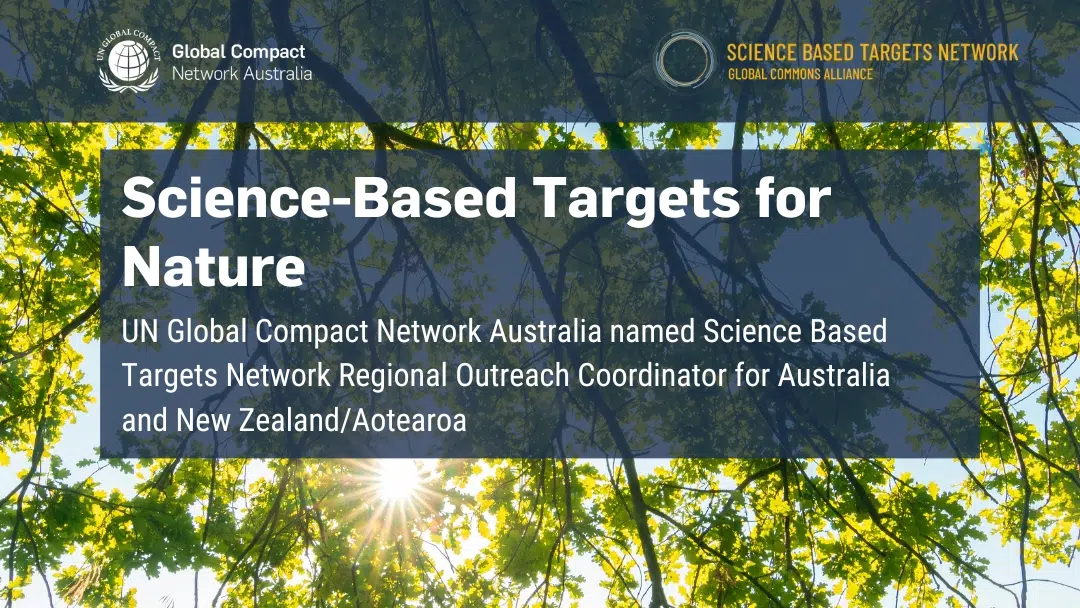
Environment & Climate Change, News
UN Global Compact Network Australia appointed Regional Outreach Coordinator for Science Based Targets Network in Australia and New Zealand
Dr Evan Center | June 7, 2023
The UN Global Compact Network Australia (UNGCNA), the Australian local network of the United Nations (UN) Global Compact, will spearhead the regional strategy for the world recognised network, Science Based Targets. With support from the Rockefeller Foundation, the UNGCNA will operate as the Science Based Targets Network Regional Outreach Coordinator for Australia and New Zealand/Aotearoa.
As Regional Outreach Coordinator, UNGCNA will convene a working group that outlines a regional strategy for nature-positive business engagement. Subsequently, the UNGCNA aims to deliver a science-based targets roadshow in both Australia and New Zealand /Aotearoa by the end of 2024.
The Science Based Targets Network (SBTN) brings “nature into the boardroom” as the world’s first science-based targets for nature. Its targets are aligned with global goals on climate, nature, and development, which includes both the Paris Agreement and the UN Sustainable Development Goals (SDGs).
“It’s exciting to see the extent to which Australian businesses are embracing science-based targets through decarbonisation efforts. However, we cannot curb our emissions without simultaneously addressing our impact on nature,” explains Kate Dundas, UN Global Compact Network Australia Executive Director.
“With the renewed focus on nature-positive outcomes, which have been driven by COP15’s Kunming-Montreal Global Biodiversity Framework, it is so very important that we utilise all tools at our disposal. The SBTN, and disclosure frameworks such as TNFD, help organisations produce a truly positive and sustainable impact on both nature and our subsequent climate.”
The roll-out of science-based targets for nature follows and works alongside the Kunming-Montreal Global Biodiversity Framework (GBF). The GBF is the recent nature-based equivalent to the Paris Agreement on climate, which was finalised at the UN Biodiversity Conference (COP15) last December. Science-based targets for nature provide a key mechanism for operationalising the GBF—including addressing GBF Target 15, which focuses on the role of business in managing and disclosing their impact on nature.
Both the SBTN and the soon-to-be finalised Taskforce on Nature-related Financial Disclosure (TNFD) are working together to help corporates and financial institutions incorporate nature into their decision-making process. Likewise, the TNFD has also adopted SBTN’s definitions of impacts and dependences on nature, with joint target-setting guidance with plans to further expand areas of alignment.
As TNFD Executive Director Tony Goldner explains, “Following the breakthrough global agreement on tackling nature loss achieved at COP15 in Montreal, the release of SBTN’s first target-setting methodologies is an important step forward in enabling practical corporate action.”
Ultimately, the SBTN aims to transform economic systems and protect the global commons – our air, water, land, biodiversity and ocean. The SBTN does so by providing guidance for companies to holistically assess and prioritise their environmental impacts. Likewise, the SBTN offers a five-step process to track corporate targets across freshwater, land, ocean, biodiversity and climate – with the later working alongside the Science-based Targets initiative (SBTi). Notably, science-based targets for nature have just been released for land and freshwater, with validation and targets for ocean set to be released in 2024.
Dr Evan Center, UNGCNA Environment and Climate Change Manager said “I truly believe that Australia can lead the world in fostering biodiversity and facilitating nature-positive solutions. The love of country—its lands, waterways and seas—is such a uniquely uniting force. There is an opportunity for our Australian businesses to build and promote incredible resilience within our natural ecosystems. In doing so we can deliver within on both the UN Global Compact Networks’ guiding Ten Principles and the UN Sustainable Development Goal’s focus on climate action, life on land and life below water.”
About the Science Based Targets Network
The Science Based Targets Network (SBTN) brings together more than 60 NGOs, business associations and consultancies to collectively define what is necessary for businesses to do “enough” to stay within Earth’s limits and sustainably meet global needs. An initial group of seventeen global companies are preparing to submit targets for validation, including AB InBev, Alpro (part of Danone), Bel, Carrefour, Corbion, GSK, H&M Group, Hindustan Zinc Limited, Holcim Group, Kering, L’OCCITANE Group, LVMH, Nestlé, Neste Corporation, Suntory Holdings Limited, Tesco and UPM.
The work builds on the momentum of the Science Based Targets initiative, a partnership between CDP, the United Nations Global Compact, World Resources Institute (WRI) and the World Wide Fund for Nature (WWF). The organisations that make up the Science Based Targets initiative are among the core founding partners of the SBTN. Over 200 organizations have already helped road-test SBTN’s initial methods, tools and guidance including 115 companies; the majority of whom participate in SBTN’s Corporate Engagement Program – representing 20+ sectors in 25 countries with over $4 trillion in market cap.
The SBTN responds to a demand for more methods, guidance and tools to set science-based targets for the whole Earth system.

